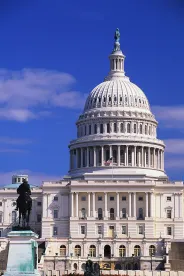Following President Joe Biden’s inauguration, Democrats control the executive and legislative branches of government for the first time in 10 years. Democrats presently have a three-seat majority in the House while Democratic victories in the Georgia runoff election have created a 50-50 Senate split. With Vice President Kamala Harris’ tie-breaking vote, Democrats also control the balance of power in the Senate.
In previous instances of an evenly divided Senate, leaders adopted a power sharing agreement to govern procedures, the consideration of legislation, the committee process and leadership positions. Senate leadership is negotiating a similar agreement for the 117th Congress, although partisan politics may delay consensus.* Slim majorities historically have fostered increased bipartisanship and passage of moderate measures that are often less contentious. Although we anticipate that bipartisanship will be necessary to advance significant legislation, Democratic control of Congress gives President Biden opportunities to push signature items in his first-term agenda. The following overview describes legislative and executive action items that the White House and new Congress intend to pursue in the initial months of the President Biden Administration.
*For additional information, the Congressional Research Service (CRS) published a paper that explains how the Senate navigated the most recent 50-50 split in 2001.
COVID Stimulus & Response
On January 14, President-elect Biden unveiled his nearly $2 trillion COVID relief proposal and called on Congress to enact it quickly. The proposal includes $400 billion for vaccines and testing, $1 trillion in direct stimulus payments and unemployment assistance, and $440 billion in aid to state and local governments and small businesses. House Speaker Nancy Pelosi (D-CA) and Senate Majority Leader Chuck Schumer (D-NY) said that the President’s COVID package would be one of the first legislative issues Congress will consider.
Congressional Democrats are discussing using the budget reconciliation process to advance these legislative priorities if bipartisan agreements are not reached. While budget reconciliation has a number of limitations, it allows the Senate to advance spending and tax related legislation with a simple majority vote instead of the 60-vote threshold needed for most legislation. Since the 1980s, Congress has successfully used the reconciliation process to pass 21 bills that were signed into law. These most recently included the 2001 Bush tax cuts, portions of the 2010 Affordable Care Act (ACA) and the 2017 Tax Cuts and Jobs Act (TCJA).
The Biden Administration additionally is prioritizing the federal response to the COVID-19 pandemic through a number of Presidential actions. Prior to President Biden’s inauguration, the incoming White House Chief of Staff issued a memo outlining the President’s executive agenda for the first 10 days in office, and the President has since signed Executive Orders and memoranda updating federal COVID-19 testing policies, authorizing use of the Defense Production Act (DPA) to stabilize the supply chain for critical medical supplies and boosting the federal government’s vaccine distribution plans. The White House also issued a memo to federal agencies directing them to freeze all agency rules and guidance issued by the Trump Administration that have not taken effect. (A full listing of Presidential actions is available on the White House website.)
To complement President Biden’s executive actions, Democratic leaders in the Senate are coordinating with the White House to expedite the confirmation process for senior executive branch officials. Although a number of Senate Republicans have expressed concern with President Biden’s nominees to lead the Office of Management and Budget and Health and Human Services, the Senate will be able to approve their nominations with a simple majority. Because it may take several weeks to begin confirming the President’s health nominees, due in part to a delay in the adoption of a Senate power sharing agreement, the Biden Administration announced acting health agency leadership to oversee day-to-day management of the Administration’s agenda. It is also important to note that the confirmation timeline could be further impacted by the timing and duration of the Senate impeachment trial of former President Trump.
Health Care Reform
President Biden is expected to work closely with Congressional Democrats to propose legislation to strengthen and expand the ACA and address drug prices. With Congressional Republicans unlikely to support significant changes to the ACA, the Biden Administration may decide to work first through the regulatory process to overturn many of President Trump’s changes to the law. These regulatory actions could include changes to the annual enrollment process, along with reversing rules that allowed for the sale of non-ACA compliant plans.
With health care a central issue in the 2020 elections, Senate Finance Committee Chairman Ron Wyden (D-OR) aims to refocus Democrats’ efforts on drug pricing legislation. Wyden intends to use a bipartisan drug pricing package introduced in the previous Congress with Senator Chuck Grassley (R-IA) as a starting point for renewed work on this issue. Their bill, the Prescription Drug Pricing Reduction and Health and Human Services Improvements Act, would have required drug manufacturers to pay rebates in Medicare Part B and Part D for drugs and biologicals whose prices increase faster than inflation. Wyden also has expressed his interest in crafting a package that would permit Medicare to negotiate drug prices with manufacturers, similar to a measure (H.R. 3) passed by House Democrats in 2019. Preliminary discussions suggest that Congress may consider drug pricing legislation more fully in late spring or early summer once COVID-related priorities are completed. Chairman Wyden also has indicated that Democrats are open to using the fast-track budget reconciliation process to pass a drug pricing measure and avoid potential negotiating delays with Republicans, though he presently has remained non-committal on whether reconciliation is his preferred approach.
We additionally are anticipating President Biden’s first budget request to Congress in either February or March. The budget will outline the Administration’s top spending and legislative priorities for the coming year and likely will include proposals to strengthen and expand the ACA, provide additional flexibilities to Medicare to manage drug prices, invest in rural health infrastructure (including telehealth), address health equity issues and expand the health workforce. Once the President’s budget is transmitted to Congress, senior Administration officials will testify before Congressional committees and provide budget justifications. These steps will officially begin the fiscal year (FY) 2022 appropriations process where Democratic leadership on the House and Senate Appropriations Committees are likely to use the President’s budget as a road map to begin drafting FY 2022 spending bills.
Infrastructure & Trade
President Biden has pledged to provide extended details on an infrastructure package in a joint session of Congress next month. The announcement may include proposals to create manufacturing and technology jobs that were unveiled in the campaign’s Build Back Better plan, which includes a $300 billion investment in R&D targeted to a range of industries and specifically references health and medicine. The proposal additionally may build on aspects of President Biden’s plan to rebuild U.S. supply chains, particularly in sectors where the U.S. faces national security vulnerabilities. While highways and bridges are major candidates for an infrastructure package, work in this area may have significant implications for broader categories of American manufacturing and even federal purchasing agreements.
The timing of infrastructure negotiations also may affect pending work on trade deals with partners such as the EU and UK and re-examination of the United States’ participation in the Trans-Pacific Partnership (TPP). President Biden stated during the campaign that he would not seek to complete pending trade agreements until after Congress passes domestic investments to rebuild the U.S. economy.
The first year of a new Congress and Administration always features a full agenda. 2021 will be no different as policymakers will be focused on responding to the ongoing pandemic and rebuilding the U.S. economy and health care system. As always, the agenda can change, but our Public Policy Group will be closely monitoring developments to help ensure that our clients are informed and ready to participate in the policymaking process.







 />i
/>i

